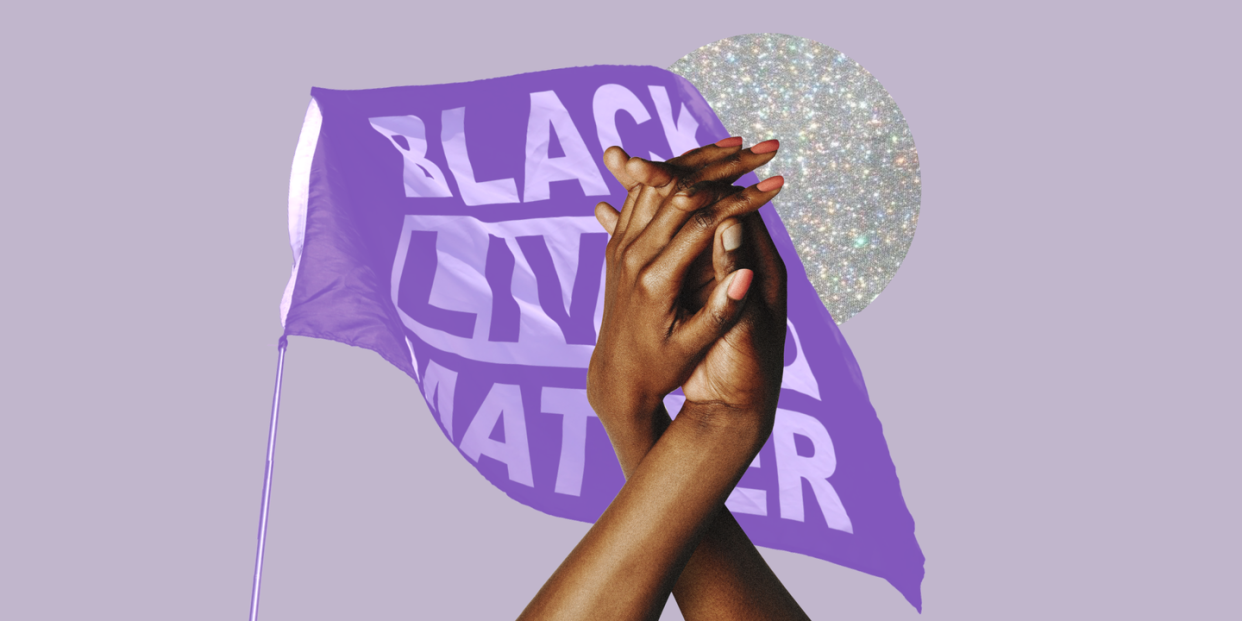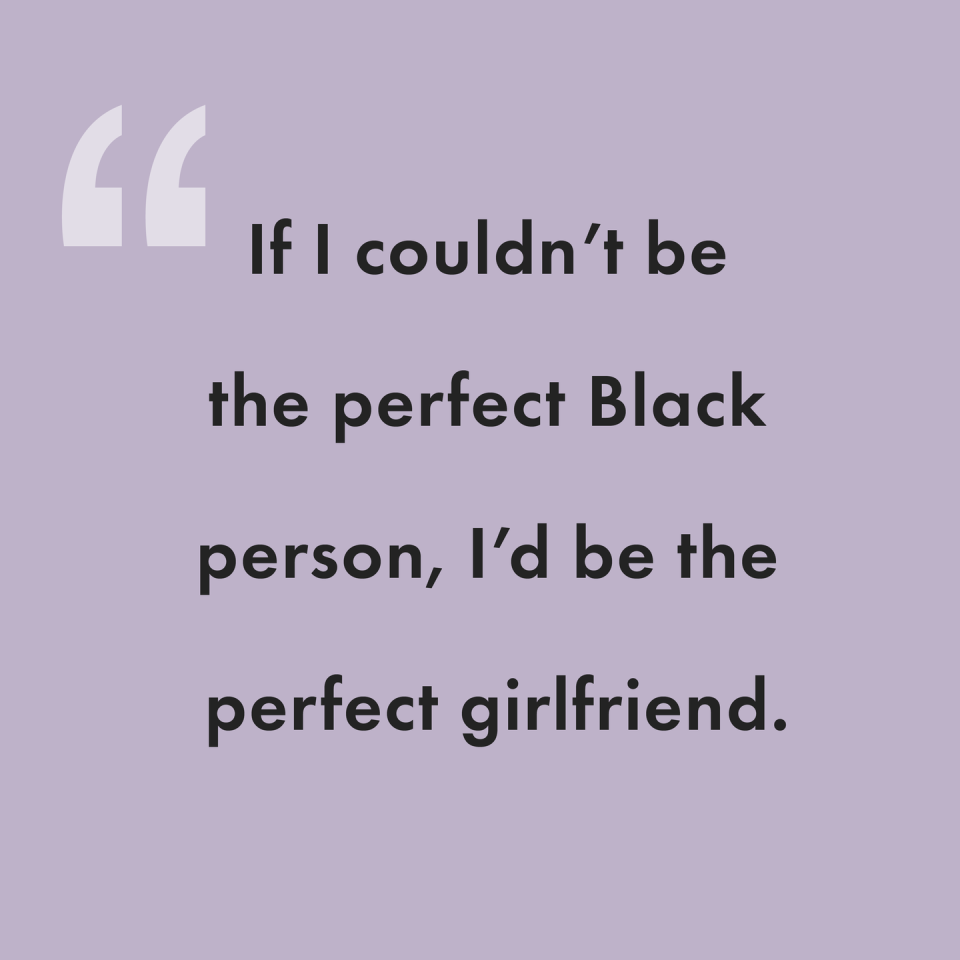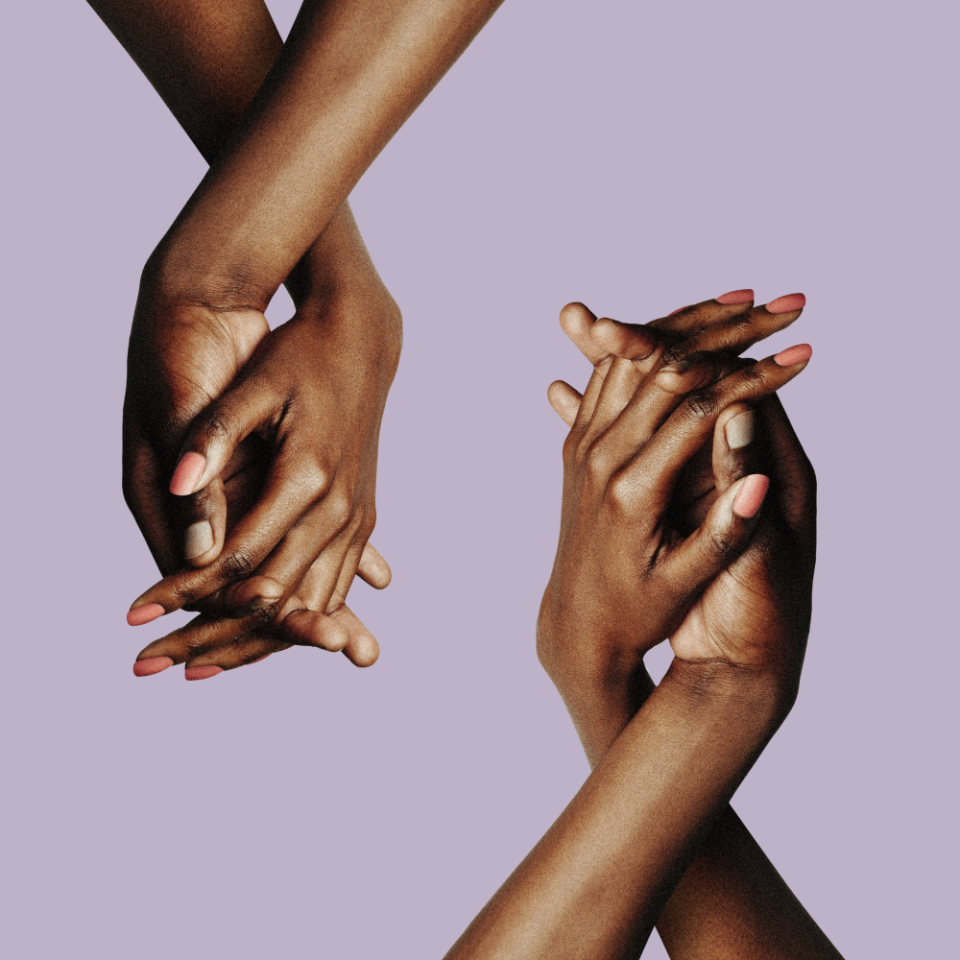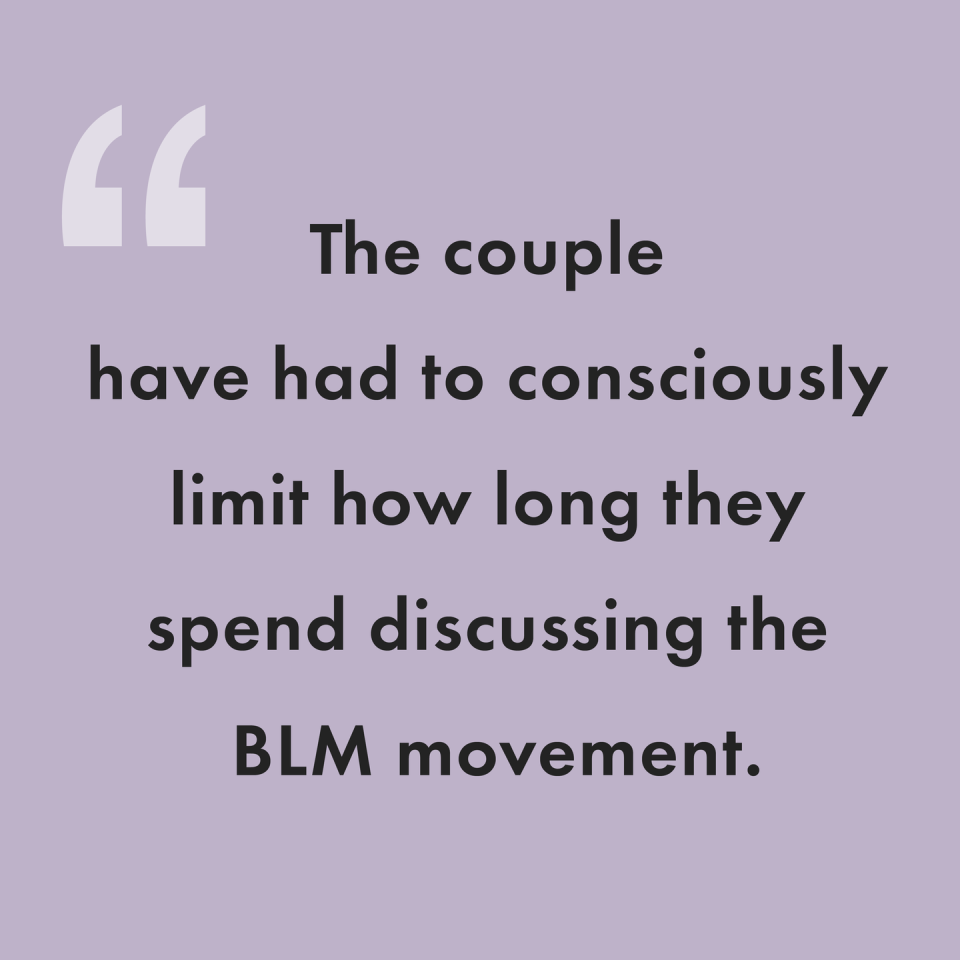How are Black and interracial couples coping with a double pandemic?

“I feel like I’m a bad Black person.” The words came tumbling out of my mouth during a routine FaceTime call with my long-distance boyfriend. He scrambled to formulate a pep talk, but before he could deliver it, I launched into a tirade. Feelings I’d been bottling up for weeks erupted. Images of George Floyd and headlines about his murder had been replaying in my mind, ever since the tragedy sparked a global alarm about the realities of being Black in America. Over in the UK, racial equality was also placed under a microscope, as people finally discussed how racism is deeply embedded within British culture too.
As newsfeeds filled with #BlackOutTuesday posts and non-Black friends consistently asked how I was, as protests peaked and the Black Lives Matter movement gained meaningful momentum, I felt a failure. The pressure to play a leading role was real. My heart was troubled and all of these anxious thoughts came rushing out in a stream of word-vomit that day, phone in hand reflecting my tear-stained face. As people started reading Black literature (some for the first time) and began unpacking the racist origins of policing, capitalism and other societal institutions, a deep-rooted fear that I wasn’t responding "correctly" had me gripped.
I participated in some of these important actions – I protested, donated and consciously threw my money at Black-owned businesses. But still couldn’t completely quit Amazon's free shipping. My nomadic childhood, in which I occupied mostly white spaces, made me question whether I was qualified enough to even speak on the Black experience. I felt like the least educated person in the room. Soon, ‘Am I doing enough?’ and ‘Am I Black enough?’ turned into point-blank: ‘Am I enough?’

This self-doubt quickly bled into other parts of my life too. Prior to my FaceTime breakdown, I’d denied my feelings of inadequacy, burying them deep. They then manifested as an obsession with perfection in other areas of my life. If I couldn’t be the perfect Black person, I’d be the perfect daughter, writer and girlfriend. The latter effort was particularly strenuous. My boyfriend and I met in high school in Nairobi. At the time we were nothing more than acquaintances, but years later, after I moved to Washington DC, he slid into my DMs and started a romance that’s brought immense joy to my life. We’re separated by an ocean and a 7-hour time difference – so the nature of our relationship already requires extra effort. Being “the perfect girlfriend” now meant doing more than the most. I began sending him morning, noon and night voice notes. I’d iMessage sporadic sonnets, expressing my love. All the while, feeling below par. But by trying to be so "perfect" was I achieving anything? Or, actually harming my relationship? And, if so, why?
Pressures, perfectionism and Black love
Hypnotherapist, relationship coach and matchmaker, Amari Ice, perfectly summarises my feelings: “One symptom of white supremacy is perfectionism,” he says during our call. “The unrealistic pressure to be perfect is a result of growing up in a white supremacist capitalist culture. Recognising that allows you to realise you’re internalising the oppression of the society and the system, to where you’ve now become your own oppressor.” Hearing that, I instantly felt less alone.
I was my own oppressor – and my boyfriend, an intuitive man, had started to notice too. As a result, we began to share conversations about our respective Blackness, and what, in this “new normal” we needed to feel fulfilled, supported and loved. My boyfriend and I share an ethnicity, so our conversations of race have always been ‘us vs. them’ – we’ve found camaraderie in our shared experiences of racism, but rarely discussed how our Blackness varies. His relationship with the police, for example, differs – he’s experienced being unjustly arrested and monitored on the streets. I know it happens, but have never felt it directly. Through our conversations, we’ve also learnt that when overwhelmed, my boyfriend needs time. Whereas I need to be smothered in love and distracted. Was it the same for other couples? How have they been impacted by this year? I spoke to a few to find out.
Devan and Paul
Devan and her fiancé Paul, a London-based couple both in their twenties, who’ve had to navigate planning a wedding during the pandemic, have also learnt that communication is paramount. As a self-proclaimed “bad communicator”, Devan’s become more expressive – and her newfound openness came at the perfect time, as BLM hit the couple hard, in different ways.

“Devan and I have educated each other,” says Paul, who didn’t grow up in a space embedded with nuanced racism, and has come to confront his own relationship with being Black through conversations with his partner. “I’ve had some experiences with racism, but I grew up in Nigeria. So, when people look at me to talk about things like BLM, I can shy away, because I don’t feel fully qualified.” With Devan’s help, he now says he’s “been researching and exposed to a world of Black authors who talk about the symptoms of white supremacy and capitalism of the Black community.”
The young couple’s acceptance of their differences and their willingness to learn and grow together is Black Love at its best.
Ivana and Yaw
Married couple Ivana, 36, and Yaw, 44, from Hertfordshire, are thinking about their future too. They’ve had to navigate being an interracial couple, raising Black sons and the quarantine. “As a motherhood coach, I teach my clients how to calm their anxieties,” says Ivana. “I’ve had to take my own advice, which is always challenging.” Early on in their marriage, Ivana says she and Yaw spoke about the realities of being an interracial couple – and she had to admit she didn’t believe racism was prevalent in today’s society. “When we started dating, I thought he was paranoid. I’d say, ‘Stop worrying! Nobody’s looking at you’,” she confesses. “It took a lot of time and talking to admit racism is real.”
Ivana’s realisation happened slowly, as Yaw explained the micro-aggressions and daily spouts of racism he faced. They continue to have conversations because, as Yaw puts, “the learning never stops,” especially when raising twin boys. “I can now admit our kids will have to deal with racism,” Ivana says. “That was hard. I couldn’t make peace with it for a while.” Meanwhile, Yaw is realising his Black experience will not match that of his kids. “This generation of Black youth are going to experience their Blackness differently than I do,” he says. “There’s a lot to learn, as a parent and as a person.”
Kia and Tyrell
We’re all learning, including Manchester-based couple Kia, 27, and Tyrell, 28. Kia identifies as queer and Tyrell is a trans man. For them, conversations about race, gender and identity aren’t foreign. “As a queer couple, we experience the impact of injustices in multiple ways,” Kia explains. “We experience injustice as Black people, and as members of the LGBTQIA+ community. It can be complex and we talk about it often.” In fact, the couple have had to consciously limit how long they spend discussing the BLM movement and their Blackness. “I’d see it affect Kia's mood which in turn would affect my own,” Tyrell explains.

Quarantine also gave the couple time to focus on what police brutality looks like in the UK. “Witnessing the movement has given me more time to focus on what’s happening here, rather than in America,” Kia explains, adding that they've had to work through feelings of hopelessness. They both lamented being separated from their community due to the virus, but ultimately, say they’re able to still find strength in each other and friends in different ways. Kia adds that she’s now feeling more appreciative of the people in her life too.
Being Black is beautiful but complicated. Being Black in quarantine, as the world reconciles with both inherent racism and the instability of a global pandemic, is even more complicated. But, if, as a global community, we forge forward with empathy, understanding, and consideration, we can start to rebuild and heal. For the Black community, it’s vital to check in with one another and practice self-care. “By actively making self-care a priority, you’re sending yourself the message that regardless of the stressors of the world you are worthy of looking after and of love,” advises Dr. Michaela Dunbar, a Clinical Psychologist and expert in trauma and stress.
When I eventually stopped crying, my boyfriend looked at me lovingly via FaceTime. He spoke quietly, but his words were loud. “Kui, your Blackness is enough because it’s you – and who you are is enough. For me and the world.” Now, I know he’s right. I don’t need to read all of James Baldwin’s works or dedicate my life to social justice to claim my Blackness. My Blackness radiates and manifests in everything I do. I am enough – and when you feel enough within yourself, that can only benefit your relationship too.
Follow Kui on Twitter and Instagram
SUBSCRIBE HERE to have Cosmopolitan delivered to your door and here for our newsletter to land straight in your inbox.
You Might Also Like


